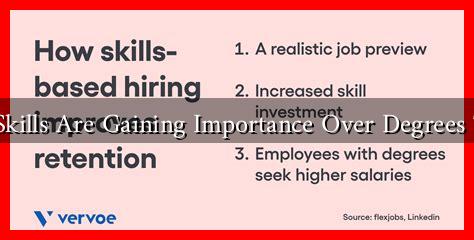-
Table of Contents
Why Skills Are Gaining Importance Over Degrees Today
In an era marked by rapid technological advancements and shifting job market dynamics, the traditional notion of education is undergoing a significant transformation. While degrees have long been considered the gold standard for employment, a growing number of employers are prioritizing skills over formal qualifications. This article explores the reasons behind this shift, the implications for job seekers, and the future of education in the workforce.
The Changing Landscape of Employment
As industries evolve, so do the requirements for job candidates. The rise of automation, artificial intelligence, and digital technologies has led to a demand for specific skill sets that often surpass what is taught in traditional degree programs. According to a report by the World Economic Forum, by 2025, 85 million jobs may be displaced by a shift in labor between humans and machines, while 97 million new roles may emerge that are more adapted to the new division of labor. This shift underscores the importance of skills in the modern job market.
Why Skills Matter More Than Degrees
Several factors contribute to the increasing emphasis on skills over degrees:
- Practical Experience: Employers are increasingly valuing hands-on experience and practical skills. For instance, tech companies often prefer candidates who can demonstrate coding abilities through projects or portfolios rather than solely relying on a computer science degree.
- Rapidly Changing Industries: In fields like technology and digital marketing, the pace of change is so fast that a degree can quickly become outdated. Continuous learning and adaptability are essential, making skills more relevant than formal education.
- Cost of Education: The rising cost of higher education has led many to question the return on investment of a degree. According to the Federal Reserve, student loan debt in the U.S. has surpassed $1.7 trillion, prompting individuals to seek alternative pathways to employment.
- Employer Preferences: A survey by LinkedIn found that 92% of hiring managers consider skills to be more important than degrees. Companies like Google and Apple have already shifted their hiring practices to focus on skills, often hiring candidates without traditional degrees.
Case Studies: Companies Leading the Change
Several companies have taken significant steps to prioritize skills over degrees:
- Google: Google has implemented a hiring strategy that emphasizes skills assessments and practical experience. Their Google Career Certificates program offers training in high-demand fields like data analytics and project management, allowing individuals to gain relevant skills without a degree.
- IBM: IBM has launched initiatives to recruit talent based on skills rather than degrees. Their “New Collar” jobs focus on skills in technology and cybersecurity, providing opportunities for individuals from diverse educational backgrounds.
- Apple: Apple has also moved towards skills-based hiring, emphasizing the importance of practical experience and problem-solving abilities over formal educational credentials.
The Role of Online Learning and Certifications
The rise of online learning platforms has made it easier for individuals to acquire new skills. Websites like Coursera, Udacity, and LinkedIn Learning offer courses that are often developed in collaboration with industry leaders. These platforms provide certifications that can enhance a candidate’s employability. A report from the Online Learning Consortium indicates that 70% of employers believe that online learning is as credible as traditional education.
Conclusion: Embracing a Skills-First Approach
The shift from degrees to skills is not just a trend; it is a fundamental change in how we view education and employment. As industries continue to evolve, the ability to adapt and acquire new skills will be paramount for job seekers. For individuals, this means embracing lifelong learning and seeking out opportunities to develop relevant skills through online courses, internships, and practical experiences.
In summary, the importance of skills over degrees reflects the changing demands of the job market. As companies increasingly prioritize practical abilities, job seekers must be proactive in acquiring and demonstrating their skills. The future of work will likely favor those who can adapt, learn, and grow in an ever-changing landscape.
For more insights on the future of work and skills development, visit World Economic Forum.

